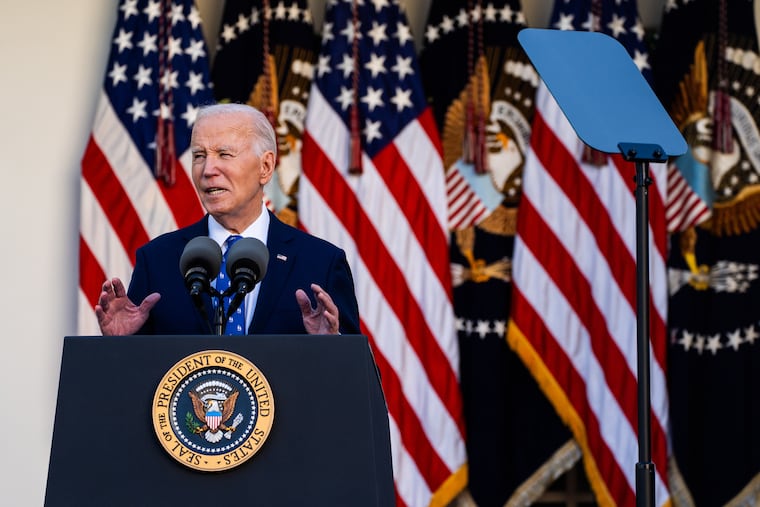Governors should expand Biden’s clemency to address the failures of mass incarceration
Gov. Josh Shapiro and his counterparts in other states must join the president in expanding the number of commutations and pardons as a corrective to the failed mass incarceration system.

President Joe Biden’s decision to commute the sentences of 1,500 people and to pardon another 39 is an important step toward addressing the failures of mass incarceration. This is the largest number of commutations made by an American president in a single day but is only a fraction of the 600,000 incarcerated people who could and should be released without risking public safety.
Like presidents, governors are granted clemency powers to signal when a policy has not worked, and there is a proliferation of proof that mass incarceration has been an utter failure. Gov. Josh Shapiro and other state governors must join Biden in expanding the number of commutations and pardons. Doing so would transform the president’s gesture into a bold corrective that would save taxpayers billions of dollars, maintain security, and restore families and communities.
» READ MORE: Pennsylvania’s Board of Pardons should show mercy to more people like me | Opinion
As researchers and activists, we have witnessed and experienced the devastating effects of overincarceration firsthand. We have volunteered in Philadelphia’s jails, counseled people in reentry who are working to rebuild their lives, and interviewed dozens of formerly incarcerated people who have lost their children, their homes, and their jobs as a result of being locked up. One of us, Jamila W. Harris, was incarcerated nearly two decades ago and continues to endure the consequences of imprisonment for a nonviolent crime.
Critics of mass incarceration argue that it is a moral calamity and a public policy disaster that has proven ineffective in reducing crime while devastating countless lives. The carceral system also costs $182 billion annually — taxpayer money that could be better spent elsewhere. Incarceration in the U.S. exacts profound social and economic costs that disproportionately affect women, low-income people, and communities of color.
Although public safety is a key reason to put people behind bars, a report by the Brennan Center for Justice found that approximately 40% of people currently held in prison do not pose a significant risk to their communities.
Releasing those who are unlikely to endanger others is a proven strategy. California sent thousands of incarcerated people home during the COVID-19 pandemic to avoid deadly outbreaks of the disease. A recent study by researchers at the University of California, Irvine, found that the Golden State’s strategy did not result in an increase in crime.
The 1,500 people granted clemency by Biden were among the 13,204 who had already been released and placed in home confinement during the pandemic. The president’s commutations prevent them from being sent back to prison, as some Republicans are threatening to do. Only 22 of the 13,204 people placed in home confinement during the pandemic committed new crimes — an astonishingly low number. Thousands of others could be granted the same opportunity to rebuild their lives and contribute to society.
The groups that most merit consideration for clemency include nonviolent offenders, those who would receive shorter sentences if they were to be charged under today’s policies, and the older adults who make up an increasingly large percentage of incarcerated individuals and who are much less likely to recidivate than younger people.
» READ MORE: Commutations can relieve costs of sick and aging prison population — and reverse decades of bad policy | Editorial
Expanding clemency would have the bonus of addressing the overcrowding and understaffing that have created dangerous conditions for both prison staff and those who are incarcerated. Philadelphia’s challenges with these issues illustrate the intractability of these problems.
One Voice United, an advocacy organization for corrections staff, has created an unlikely partnership with Families Against Mandatory Minimums to address understaffing. Their joint statement argues that “unprecedented staffing shortages ... make it nearly impossible to ensure the safety of staff and the people in prison, provide adequate medical and mental health care, or offer the treatment, education, and job training programs that have been shown to reduce reoffending and make our communities safer.”
In his statement, Biden vowed to “take more steps in the weeks ahead.” It’s essential that both he and our nation’s governors do so by expanding the actions taken this week and offering second chances to the many Americans who can safely and productively return home.
Jamila W. Harris is coeditor of Prison Health News and a certified peer specialist for people impacted by the justice system with mental health and/or recovery challenges. Lisa Servon is the Kevin and Erica Penn Presidential Professor of city and regional planning at the University of Pennsylvania.